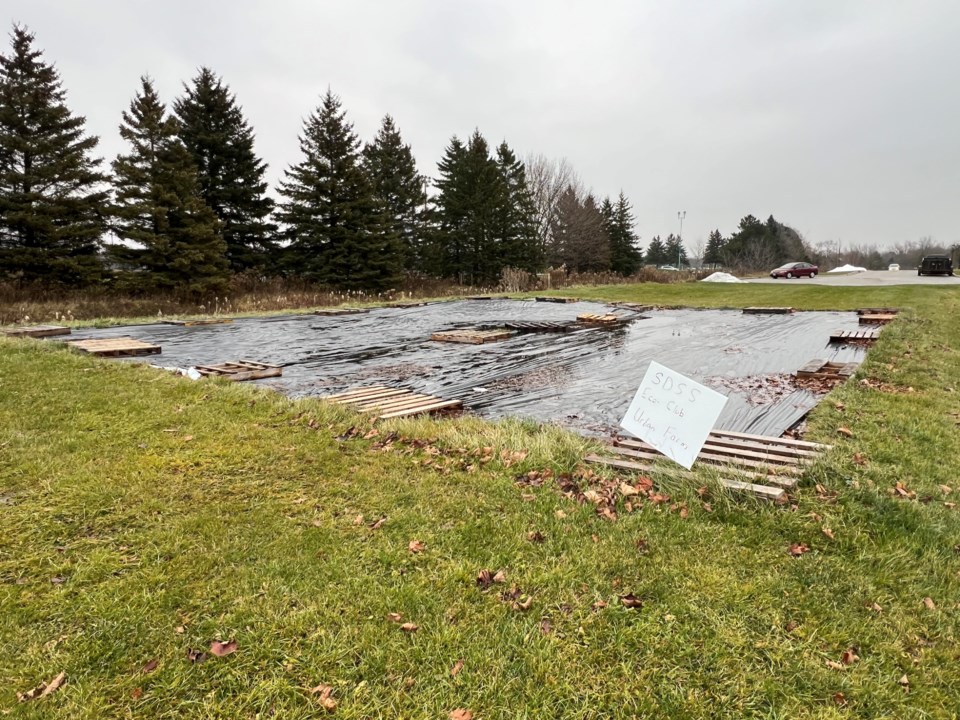When the Eco Club at Stratford District Secondary School (SDSS) was approached to start a community garden, members thought it was a good idea, even after they were hit with a hefty price tag.
To start the garden, they needed to get $5 million worth of general liability insurance.
The proposed garden is located at the very end of Smith Street, in the swath of grass next to O’Loane Avenue. It is a small patch of land currently covered in a plastic tarp with a small sign marking it.
“The idea was to take an unused patch of grass and turn it into a farm,” Lucy Chung, a member of the Eco Club said. “Makes sense, right? There's nothing happening there. It's not good enough to build a house on really, and it's owned by the city.”
Community gardens are places where people can grow their own food, flowers, and spend time in nature. Often they are a response to the rising costs of food.
Why is such high coverage needed? Because it is owned by the City of Stratford.
In February, Stratford City Council raised the minimum insurance requirement for businesses. Originally all businesses in Stratford would require $5 million insurance, as opposed to the previous $2 million threshold.
After some push back at a public meeting, council approved a change only for programs and services which are directly city property or city-services related.
Tatiana Dafoe, clerk for the city, explained that whenever the city enters into an agreement with a third party for anything involving city property, it is required for that third party to carry “adequate” insurance.
As was discussed when the change was originally passed back in February, $2 million coverage is just not adequate anymore.

After hearing about the requirement, the club went out and got quotes for their proposed garden, which varied from $1,000 to $2,000 each year.
The club’s funding varies year-to-year, depending on fundraising efforts and secured grants. Some years that would completely empty the club’s coffers.
“To pay that once is maybe okay,” Chung said. “But to pay it every single year (is) too much.”
Zach Kritzer, co-chair of the club, went to a recent energy and environment committee meeting to ask them to foot the bill, or perhaps assist in finding someone to cover the costs.
Vanni Azzano, who sits on the committee, has agreed to help the group as they try to get the project going.
He told StratfordToday that they are currently discussing the insurance matter with the City of Stratford, though nothing has been confirmed yet.
He is hopeful that the matter will be resolved in some way, though is unsure how exactly it will be settled.
Although it has been a long process, the students said they are not deterred. Getting the community garden up and running is just another challenge for them.
“It definitely gives me more appreciation for both city processes and all the other people who have done this before us,” said Jocelyn Williams, co-chair.
They are looking forward to the spring when further development can get done and they can start growing. As Chung said, the project was first discussed in 2022, so many of the members have been waiting for a while to get the garden going.
Members of the eco club will start the seeds in their greenhouse at SDSS, later to be transplanted to the farm when the weather is suitable.
Christine Ritsma, a teacher who oversees the club, guessed that the first year won’t be fruitful. Nevertheless, it will be a good project for the students and the neighbours.
Ritsma shared that one of the reasons they wanted a garden was for intergenerational interaction, getting adults and neighbours to work together with high school students for the betterment of the neighbourhood.
Additionally, it would promote sustainability throughout Stratford.
“It would be neat to see if other neighbourhoods would want to do this, too,” Ritsma said.
In January, the Eco Club will be hosting a meeting with community members to decide what to plant this year and to weigh-in on timelines.
Until then, the club will have to wait for better weather before getting started.



